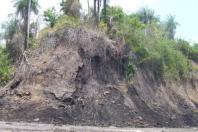US (tar sands)
The plot:
While debates about pipelines associated with tar sands bitumen from Canada traversing US territory continue, precedents are being possibly set in Utah allowing that Canadian industry to export upstream and not just downstream technology. Many US states have bitumen deposits that if produced not only would wreak havoc on any possible climate mitigation but also decimate already sparse local water tables in many different places across the Lower 48 and Alaska. Strip mining proposed in Utah is by a Canadian "oil sands" company, "US Oil Sands".
The details:
There are many places throughout the United States that contain bitumen in place, otherwise known as tar sands or oil sands. In the state of Utah, an Alberta-based company named “US Oil Sands” has received permit approval for the first open pit bitumen mine in the United States (In Grand and Uintah counties--closest to Vernal, UT), while in California in-situ operations already exist near Oxnard in Pleasant Valley (approximately 50 miles west of central Los Angeles).
The locations of the bitumen deposits by US state, according to the US Geological Survey, are listed below in billions of barrels (bbl):
[important note: bitumen reserves below are a combination of known reserves and educated guesses by the USGS as to the likely approximate total for a region or deposit. The actual economic or technologically recoverable size of the deposits is unknown. For a non-scientific “rule of thumb” to help make sense of these numbers, consider that Alberta and Saskatchewan in Canada are estimated to contain around 2 trillion barrels of bitumen, while recoverable barrels of synthetic oil are currently estimated at ~175 bbl. Thus, it is safe to gauge a deposit as approximately 10% recoverable as an average.]
Utah: 18.7 bbl
Alaska: 15 bbl
Alabama: 6.4 bbl
Texas: 4.9 bbl
California: 4.5 bbl
Kentucky: 3.4 bbl
Oklahoma: 0.8 bbl
New Mexico: 0.35 bbl
Wyoming: 0.15 bbl


